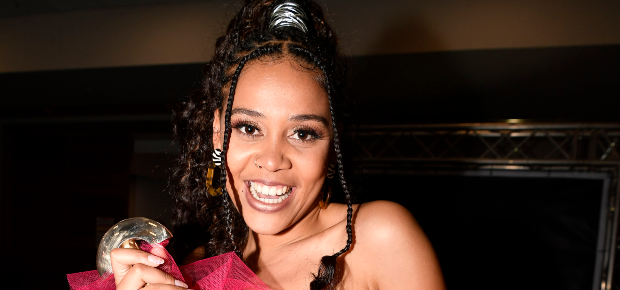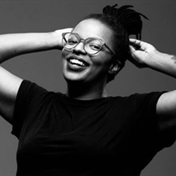
Cape Town - She posed for snaps with Cardi B and won over a host of celebrity fans, from Jidenna to Missy Elliot. Yet inspiring young girls is what brings Sho Madjozi the most fulfilment.
"Of course it’s nice when people like Missy Elliott, Chris Martin or John Cena acknowledge your work," she says. "That is exciting, but the thing that gives me deep satisfaction is when little girls are like, ‘I want to look like Sho Madjozi’, and not saying they want to look like Barbie."
We had a chat with the Tsonga hip-hop star.
The famous John Cena track was debuted on Colors, a musical platform showcasing talent from around the globe, and already the video has been viewed online more than 3 million times.
Despite the happy beat and warm reception, the song is about heartbreak and rejection. “It’s saying to a guy, ‘You act like you don’t see me, maybe I’m John Cena’. It’s a play on words since wrestler John Cena’s tagline is ‘you can’t see me’,” Sho says.
People certainly are sitting up and taking note of the songwriter. The wrestler first sent a shout-out on social media after hearing the track and later met her in person. But as much as Sho is gaining new fans, rejection is something she’s familiar with.
She voiced her concerns over the wave of xenophobic violence that wracked the country as she felt she needed to speak up, she tells DRUM. “I know what it feels like to be marginalised,” Sho says.
“I come from a people [the Tsonga tribe] who were marginalised. We’ve been treated as if we don’t belong in South Africa. So, I know how it feels to be the minority group.
Born Maya Wegerif, Sho is fiercely proud of her heritage. The Huku singer is fluent in isiZulu, Tsonga, Sepedi and English. She also speaks French and Swahili, which she learnt in Tanzania while living with her dad, Marc Wegerif (50), an academic with a PhD in food security.
Her parents split when she was four and Sho was raised mainly by her municipal worker mom, Rosemary Phaweni (51), in Elim, Limpopo.
READ MORE: WATCH: Swazi Dlamini performed Sho Madjozi's 'John Cena' at church service and it was amazing!
“There was a lot of Tsonga pride. I grew up seeing the women in my family putting on all this traditional attire when they wanted to look the most beautiful,” she says. “It was instilled in me from a young age that the most beautiful you can be is when you have your traditional attire on.”
After school she moved to Massachusetts in the US where she lived for four years while studying creative writing and African studies on a scholarship.
Sho had presidential ambitions and “wanted to figure out how people get elected and how to spread a message”. After graduating she joined a political campaign agency and moved to Dakar, Senegal, in 2015.
“We worked on two presidential campaigns in different African countries. I helped with strategy and writing political speeches, but after some time I felt like it wasn’t exactly what I wanted to do anymore so I came back.”
Moving back home wasn’t easy after living in “truly African countries” where black people owned land and businesses.
“When you see how Africans in other African countries own their stuff it makes an impact that you never get over,” Sho says. “South Africans are proud to the point of arrogance. We’ve completely lost ourselves but we’re looking down on other people.
“I was frustrated by that ignorance. I remember thinking the rest of Africa is going to save us. So much was taken from us that we’ve forgotten what it means to be African.
We don’t even know what an African city would look like – we know apartheid cities we were allowed to live in,” she continues. “These cities weren’t built for us; they were built so we could come here and work. That’s why, if you want to dance Xibelani (Tsonga dance) I must leave town.
The problem is, our ideas were never judged on whether they were great – if it was African, it was automatically wrong. I try to be globalised. I take the best elements of my culture and combine it with the best of everything else.”
The rapper is using her platform to encourage young people to embrace their cultures. “We tend to think African culture must stand still, like it was when colonialism started – that how they were back then is how they must remain. That’s a lie. You can be modern and African at the same time.”
The singer wants people to dream big. She started out as a ghostwriter in 2016 out of desperation. “I was broke. I wrote articles for a long time. Then I thought, ‘Lyrics, I can write lyrics’.” She rose to fame after collaborating with Okmalumkoolkat on the hit tracks Ngiyashisa Bhe and Gqi.
He encouraged Sho to step out of the shadows. “He said I should start writing for myself. It was crazy, I was like, ‘I’m not a performer’. “I didn’t see myself becoming a pop star, especially because of my background.
I also felt like I’m too intellectual for this as people don’t expect pop stars to have opinions. I did it and thought, ‘this sounds really cool’, but I didn’t think it was going to go this far.”
Earlier this year Sho took home thebest international act at the BET Awards. “My story is a testament that you can come from any village, in any forgotten part of the world, and still be a superstar,” she said in her acceptance speech.
Her latest project sees her teaming up with a beer brand to celebrate clan names. “I liked the campaign they did last year. It talked about whether we’ve lost our culture and getting it back, something which I obviously stand for.
So, I thought it was great to have an opportunity to expand on it.” She’s also working on a TV project and has more music in the pipeline. Sho doesn’t want to give too much away but does have this to say:
“Reject any narrative that says to be modern you have to get rid of everything African. “Challenge the narrative that there’s only one way of practising culture.”
READ MORE: Sho Madjozi on viral hit 'John Cena': It's inspired by heartache


















